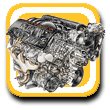 |
Out
Of Tune Engine
Anytime an engine is running out of tune due to improper air/fuel
mixture, misfiring cylinders, faulty engine sensors, incorrect
ignition timing, etc., damage to the catalytic converter will
be incurred. Proper and regular servicing per the auto manufacturers
recommendations are necessary to prevent premature catalytic
converter failure.
|
| |
|
| |
|
 |
Excess
Fuel Overheating The Catalytic Converter
An engine that is performing at peak efficiency will burn all
the fuel in the combustion chamber during the combustion process.
An engine that is not performing properly, that is not burning
all the fuel, will allow unburned or excess fuel to enter the
exhaust system. When this excess or unburned fuel contacts the
hot core of the converter it will ignite. This constant infusion
of unburned fuel will cause temperatures to continuously rise
above the designed operating temperature until the core of the
catalytic converter will actually melt. Possible causes for
the excess fuel entering the exhaust system are an incorrect
fuel mixture, incorrect timing, corroded spark plugs, worn and
cracked ignition wires, improper fuel pressure, a faulty oxygen
sensor, sticking float, faulty fuel injector or a malfunctioning
check valve.
|
| |
|
 |
Oil
or Antifreeze Entering Exhaust
When oil or antifreeze enters the exhaust system and contacts
the hot core of the converter the oil and antifreeze will burn
off leaving carbon deposits. The carbon deposits will coat the
core of the converter thus reducing the catalytic converter's
ability to convert from harmful emissions into harmless compounds.
As the carbon deposits continue to accumulate, the pores in
the ceramic catalyst will become restricted and block exhaust
flow through the exhaust system. The resulting increased backpressure
will result is a loss of power and overheated engine components.
Possible causes are worn piston rings, faulty valve seals or
valve guides, blown head gasket or intake gaskets, or warped
engine components.
|
| |
|
 |
Malfunctioning
Oxygen Sensor
The oxygen sensor measures the amount of oxygen present in the
exhaust gas. Depending on the voltage generated by the oxygen
sensor, the engine management system will change the air/fuel
ratio to obtain the desired oxygen level present in the exhaust
gas. A malfunctioning oxygen sensor sending an erroneous reading
to the engine control system can cause a too rich or too lean
condition. A rich condition will cause the converter to overheat
and melt down from the unburned fuel being ignited while a lean
condition can result in a misfire that can lead to the same
result. Oxygen sensors wear out and need to be changed per your
auto manufacturers time and mileage limits.
|
| |
|
 |
Broken
Exhaust Hangers Or Misaligned Exhaust
An exhaust system that is misaligned or allowed to rattle will
cause the fragile ceramic catalyst inside the converter to break
apart. When the core breaks or becomes loose in the converter
the brittle ceramic catalyst will continue to break up into
smaller pieces that will eventually block the flow of the exhaust.
This increased backpressure will lead to loss of power and heat
build up |
| |
|
|
| |
|
|
Failure
to correct any of the conditions above will cause your new
catalytic converter to fail. The warranty of your new converter
does not cover damage described above. Tampering with or removing
a catalytic converter from your vehicle is illegal and can
result in expensive fines.
|
| |




